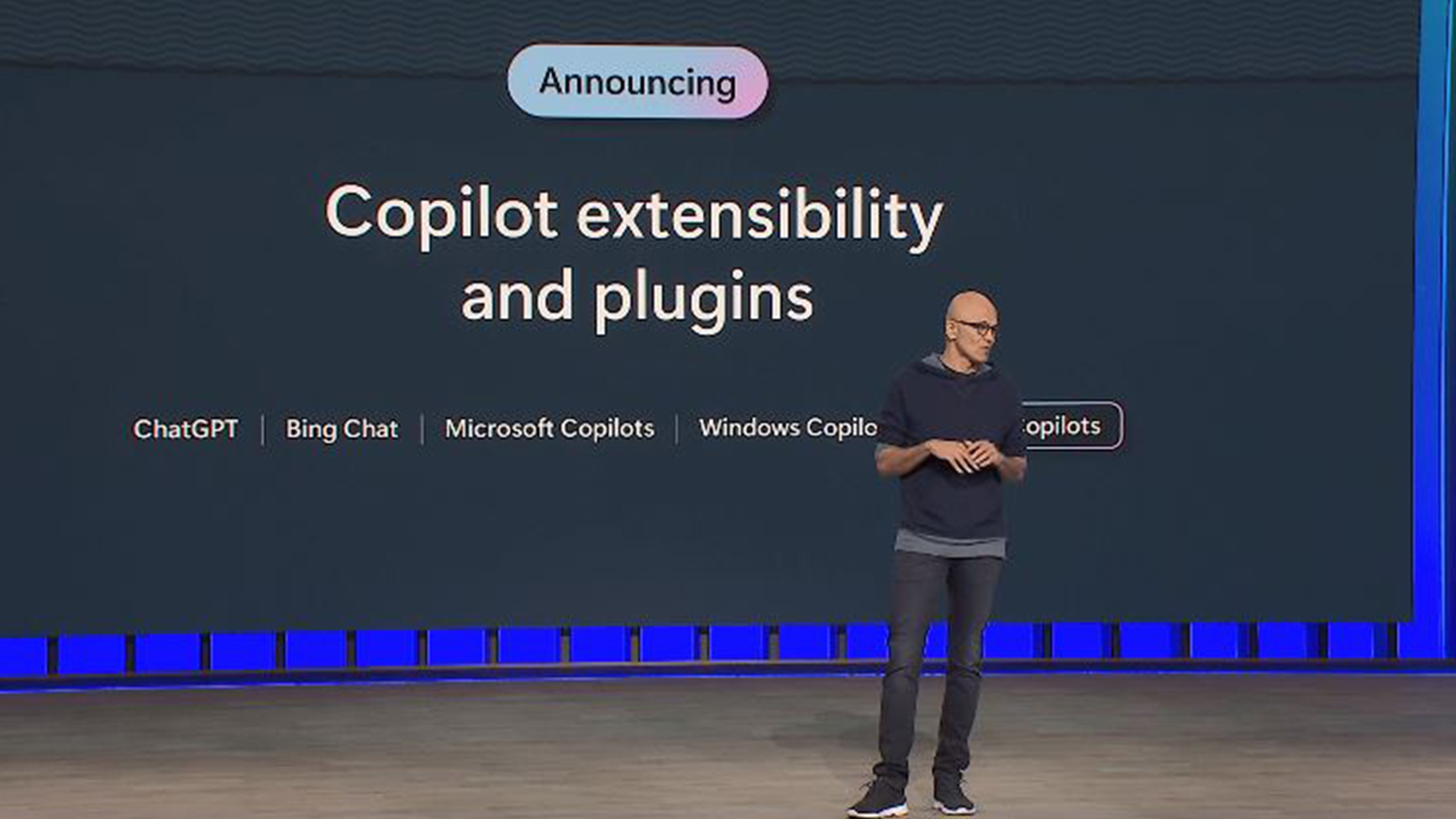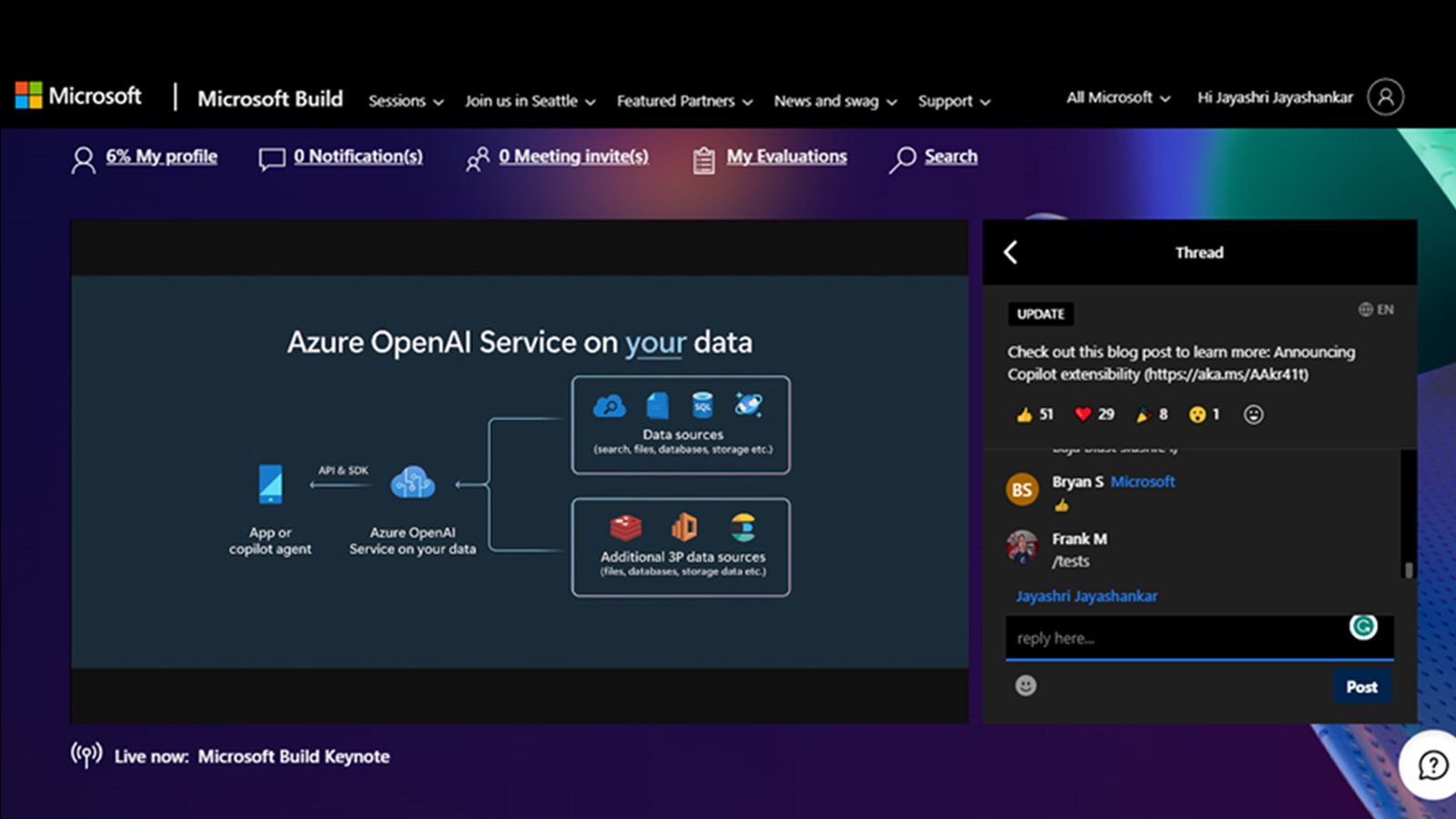Microsoft Build 2023: 5 Big Announcements & Key Takeaways
Microsoft Build, the annual flagship event that creates exciting opportunities for developers, kickstarted on May 23 at the Seattle Convention Center. Microsoft’s 3-day techathon brings together a gamut of interesting tools, and services along with some big announcements.
Given the mighty emergence of artificial intelligence in the technology realm and Microsoft’s commitment to democratize the advancements in AI, it was only logical for the software maker to heavily focus on AI.
Build 2023: What’s In Store?
The annual event highlights Microsoft’s most recent platform enhancements for developers, and this year, there’s a lot going on. Technology professionals, students, engineers, and developers are a part of the event to hear the most recent updates on Windows, Microsoft’s productivity apps, and Azure cloud services.
Asking the most basic question and speaking about the essence of being a developer, Satya said,
“One of the things we should ask ourselves as developers is why do we build? Why do we build technology? We want education and prosperity and standard of living to go up everywhere, that’s why we build. That’s why we innovate. That’s why technology exists. It’s not technology’s sake but it is for that broad impact”
The Highlight of the Event
The tech giant responsible for creating software recently released an upgraded edition of Bing, powered by GPT-4.
Additionally, they have also introduced the Copilot assistant platform for Office applications, Teams, and various other business apps.
In this piece, we are focussing on the key takeaways and the humongous amounts of announcements that were made by keynote speakers – Kevin Scott, Yusuf Mehdi, and Greg Brockman.
Recommended: Transforming Work As We Know It: 8 Things You Can Do With Microsoft Copilot 365
The event began with a keynote session by Satya Nadella, Microsoft’s chairman and chief executive officer followed by Kevin Scott, Microsoft’s chief technology officer. In his sessions, Satya shared how Microsoft is creating new opportunities for developers across our platforms in this new AI era.
What is a Copilot?
A copilot is like a trusted assistant that combines advanced AI and powerful language models to help users with complex mental tasks. the app can help you with a wide variety of tasks including crafting a persuasive sales pitch, updating you with the MOMs on a missed meeting, creating visuals for a presentation, or even planning a fun-themed dinner party.
-
The Big Integration – Copilot for Windows 11
About 2 years ago, Microsoft introduced the concept of a copilot almost with GitHub Copilot, an AI assistant that aids programmers in writing code. This year, Microsoft went all in by including copilot functionalities in its primary products and services.
 Microsoft has integrated Copilot into a number of services, including Microsoft Security Copilot, Dynamics 365 Copilot, GitHub Copilot X, the AI-driven conversation in Bing that is transforming internet searches, Microsoft 365 Copilot, and Copilot in Microsoft Viva.
Microsoft has integrated Copilot into a number of services, including Microsoft Security Copilot, Dynamics 365 Copilot, GitHub Copilot X, the AI-driven conversation in Bing that is transforming internet searches, Microsoft 365 Copilot, and Copilot in Microsoft Viva.
The announcement of Copilot Stack was also one of the highlights which means any developer can make their own Copilot whether it is ChatGPT or Bing chat.
-
Microsoft 365 Copilot Adds Support for Plug-ins
The AI assistant has improved its capabilities and now supports three major plug-in types: tools leveraging ChatGPT technology, Power Platform connectors, and Teams messaging extensions. Additionally, a variety of third-party plug-ins, including those from well-known organizations like Atlassian and Adobe, will be available for you to choose from.
What’s more? Microsoft has announced that they will adopt the same standard used by OpenAI for ChatGPT when developing their Copilot and Bing Chat plug-ins. This exciting development implies that you can use these plug-ins seamlessly across all three AI-powered tools. Additionally, it will be a breeze for developers to create and integrate these plug-ins.
As part of Satya Nadella’s keynote address at Microsoft Build, CVP and Consumer Chief Marketing Officer Yusuf Mehdi discussed Microsoft’s strategy for copilots and plugins.
-
365 Copilot Integration for Microsoft Edge
Tucked away in the sidebar, this handy tool uses the content of the website you’re visiting to help you with your projects in Microsoft 365 products like Outlook, Word, Excel, and more. You may easily complete a variety of activities with the help of this application, including creating emails, entering data into spreadsheets, creating status updates from chat threads, and much more. Additionally, by integrating this technology, Microsoft 365 Copilot will be able to support the aforementioned plug-ins that are on the way.
-
Bing is Now ChatGPT’s Primary Search Experience.
It shouldn’t come as a surprise that OpenAI has chosen to include Bing as the default search engine in its ChatGPT chatbot given Microsoft’s significant investment of billions of dollars in the company. ChatGPT Plus users will begin to see citations that Bing has found added to the chatbot’s responses.
While speaking about the launch of ChatGPT, Satya said,
The introduction of ChatGPT last November, a Mosaic moment of this generation, Satya said, we have received an upgrade. And now we look forward to, as developers, what we can do going forward.
With the addition of citations, ChatGPT’s comments can now be supported by search and online data, allowing you to learn more about a subject without ever leaving the discussion. As we speak, ChatGPT Plus customers are getting access to this great new feature, and shortly even free users will be able to do the same by simply turning on a plugin that integrates Bing into ChatGPT. How fantastic is that?
- Up-to-date results.
- Higher quality answers.
- Timely responses.
- Fresh content and citations.
Yusuf Mehdi that the power-packed combination will give higher, quality timely answers.
While speaking about the “era of the AI Copilot.” Scott said,
“You may look at Bing Chat and think this is some super magical complicated thing, but Microsoft is giving developers everything they need to get started to go build a copilot of their own. I think over the coming years, this will become an expectation for how all software works.”
-
Expansion of the Plugin System – Enabling Interoperability Across ChatGPT
Now, programmers can use a single platform to build plugins that work flawlessly across several platforms, addressing both commercial and consumer settings. This means that ChatGPT, Bing, Dynamics 365 Copilot, Microsoft 365 Copilot, and even Windows Copilot will all function perfectly with your plugins. Prepare yourself for an improved and consistent development experience across various surfaces.
Recommended: 5 Biggest AI Tools You Should Be Using Right Now with ChatGPT
Bing is expanding its plugin support as a part of this open plugin ecosystem. Expedia, Instacart, Kayak, Klarna, Redfin, TripAdvisor, and Zillow will be just a few of the services that will be a part of the Bing ecosystem in addition to those that were previously revealed for OpenTable and Wolfram Alpha.
Let’s imagine that a developer employed by a huge corporation wishes to provide Microsoft 365 Copilot the ability to find out how particular legal issues were previously handled. The developer must connect Microsoft 365 Copilot to the business’s private database of contracts with clients and suppliers in order to accomplish this. The documents must first be properly encoded, indexed, and stored before they can be made searchable. This enables the developer to access important legal data and gain knowledge based on prior encounters.
Azure – The New Updates
A number of new capabilities have been added to the Microsoft Azure AI Service with the goal of improving client productivity, efficiency, and content safety. Among these fascinating updates are:
Azure Open AI Service
Updates to the Azure OpenAI Service are being made while it is in the preview stage. These upgrades include Azure AI Studio, giving businesses the ability to seamlessly ingest data from Azure OpenAI Service. Another improvement is the provisioned throughput model, which offers reserved and dedicated capacity for more efficient operations. Additionally, the introduction of plugins simplifies the process of developing and implementing APIs by making it simple to integrate external data sources.
Azure AI Studio
While announcing Azure Ai Studio, Satya said, now developers can “build their own intelligent AI apps and copilot”
Seth Juarez, Principal program manager, Microsoft stated,
Large language models (LLM) are being included by businesses to create the newest apps. Personalized marketing text and images, summarizing lengthy reports, and creating completely new experiences with customer care chatbots are a few examples. Businesses may leverage the most cutting-edge AI models, such as Dall-E 2, GPT-3.5, GPT-4, Codex, and ChatGPT, with Azure OpenAI Service to address key use cases, unlock efficiency, reduce risk, and more.
![Azure OpenAI]() Azure AI Content Safety
Azure AI Content Safety
A new Azure AI service called Azure AI Content Safety will enable companies to build online communities and settings that are safer. Models are created to identify hatred, violent, sexual, and self-harm content in both text and images across several languages. The models give content that has been flagged a severity score, letting human moderators know what has to be dealt with right away.
Azure Cognitive Search
Developers will be able to create apps that can give product suggestions, recognize data patterns, detect fraud, and generate tailored responses in natural language. In a single integrated solution, Azure Cognitive Search provides both pure vector search and hybrid retrieval, as well as a sophisticated re-ranking engine powered by Bing.
Azure Cognitive Service for Language
Along with the entity recognition, text classification, and conversational language understanding (CLU) features that have already been announced, new features for Azure Cognitive Service for Language that are currently in preview will allow developers to customize summarization. These features are all powered by Azure OpenAI Service. For enterprises wishing to deploy large language models (LLMs), these capabilities enable developers to interactively tailor the language skills throughout their apps, resulting in a quicker time-to-value. The general release of ready-to-use documents and conversation summaries is imminent.
Document Translation in Language Studio
Developers can now translate documents in bulk using Language Studio’s Document Translation feature. Additionally, the ACS Translator plugin for Azure OpenAI Service is in private preview, as are the Power Automate Translator connection and Text Translator SDK for.Net, Python, Java, and JS.
Microsoft Fabric
At the end of Day 1, it rolled out Microsoft Fabric, a new, all-encompassing platform for data and analytics, was presented by the tech corporation. Fabric provides a seamless and simplified experience in the age of AI by merging different parts. Microsoft claims that Fabric is a cutting-edge and effective analytics solution that is not only inexpensive but also simple to operate.
Microsoft is integrating Copilot into Microsoft Fabric to allow the creation of AI plugins without the usage of machine language by using natural language (human language) and a chat experience to develop code and queries. Customers can convey the data story using AI-driven insights, the company claims, and Copilot will handle the labor-intensive tasks.
[To share your insights with us, please write to sghosh@martechseries.com].

 Azure AI Content Safety
Azure AI Content Safety
Comments are closed.